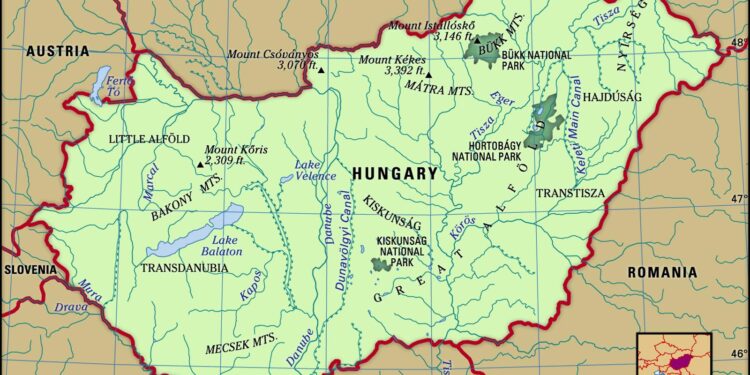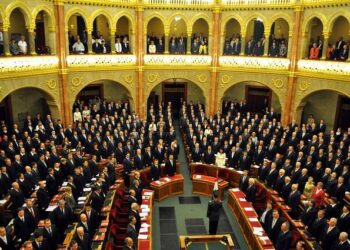Hungarian Prime Minister Viktor OrbĂĄn has boldly positioned his country as a unique geopolitical crossroads, claiming it is “the only place in Europe” suitable for a meeting between former U.S. President Donald Trump and Russian President Vladimir Putin. This assertion, coming amid ongoing tensions between the West and Moscow, highlights Hungary’s complex role on the continent and OrbĂĄn’s efforts to assert influence on the international stage. The prospect of such a summit underscores Budapest’s strategic significance and raises questions about the implications for European unity and transatlantic relations.
OrbĂĄn Highlights Hungary’s Unique Geopolitical Role in Hosting Trump Putin Summit
Prime Minister Viktor OrbĂĄn has underscored Hungary’s strategic significance on the European geopolitical landscape by positioning the country as the ideal venue for a high-stakes summit between former U.S. President Donald Trump and Russian President Vladimir Putin. Emphasizing Hungary’s neutrality and robust diplomatic relations with both the West and Russia, OrbĂĄn described the nation as a “unique bridge” where East meets West – a neutral ground pivotal for fostering dialogue amid escalating tensions.
The government’s emphasis on Hungary’s infrastructure, security capabilities, and central location within Europe further supports its bid as a preferred meeting place for international diplomacy. Key factors highlighted include:
- Geographic Centrality: Located at the heart of Europe, facilitating access from major capitals
- Diplomatic Channels: Established communication lines with both NATO members and Russia
- Security Readiness: Experienced in hosting international summits with comprehensive security measures
- Cultural Openness: A history of accommodating diverse political viewpoints in its public discourse
| Criteria | Hungary’s Advantage |
|---|---|
| Location | Central Europe |
| Diplomatic Relations | Balanced East-West ties |
| Summit Experience | Multiple international events hosted |
| Security Infrastructure | High-level readiness |
Analyzing the Strategic Implications for European Diplomacy and Security
Hungary’s positioning as a unique diplomatic venue marks a significant shift within the European security landscape. By championing itself as the exclusive European location where a Trump-Putin summit could transpire, Budapest is not only elevating its geopolitical profile but also challenging traditional Western diplomatic frameworks. This stance implicitly questions the cohesion of the European Union’s collective foreign policy, exposing underlying fractures between member states. Moreover, it signals Budapest’s attempt to broker a new diplomatic space – one that balances relations between Washington and Moscow – potentially redefining Europe’s role in global security dynamics.
Key strategic implications include:
- Increased diplomatic leverage for Hungary within both the EU and NATO, leveraging its geographic and political positioning.
- Potential strain on EU unity, as differing national interests may complicate consensus on Russia-related policies and sanctions.
- Enhanced security risks arising from closer interactions between rival powers on European soil, raising concerns about espionage and influence operations.
- Possible precedent-setting, encouraging other European states to pursue individualized foreign policy tracks.
| Aspect | Potential Outcomes |
|---|---|
| EU Diplomatic Cohesion | Fragmentation risk escalates |
| NATO Security Framework | Pressure on alliance unity |
| Hungary’s Global Influence | Significant enhancement |
| Regional Stability | Heightened volatility |
Recommendations for U.S. and European Policymakers on Engaging Hungary’s Diplomatic Position
Policymakers in the U.S. and Europe must approach Hungary’s unique diplomatic positioning with strategic nuance, balancing engagement with careful oversight. Hungary’s reported willingness to host high-profile meetings like a potential Trump-Putin summit signals its ambition to serve as a critical liaison in East-West relations. To navigate this dynamic effectively, diplomatic channels should prioritize transparent communication coupled with robust intelligence-sharing frameworks. Such measures will ensure that Hungary’s role as a mediator does not inadvertently undermine broader transatlantic security interests or complicate sanctions regimes against Russia.
Furthermore, crafting a multifaceted policy approach involves acknowledging Hungary’s domestic political landscape while reinforcing shared democratic values. Recommendations include:
- Supporting civil society initiatives in Hungary to strengthen democratic resilience and mitigate foreign influence.
- Enhancing EU engagement to encourage Hungary’s adherence to rule-of-law standards in exchange for economic and diplomatic incentives.
- Facilitating targeted bilateral dialogues that emphasize Hungary’s role as a constructive actor rather than an adversarial pivot point.
| Policy Aim | Recommended Action | |||||||
|---|---|---|---|---|---|---|---|---|
| Diplomatic Influence | Establish secure trilateral communication channels | |||||||
| Democratic Stability | Increase funding for independent media and NGOs | |||||||
| EU Integration | Link financial aid to rule-of-law benchmarks Policymakers in the U.S. and Europe must approach Hungary’s unique diplomatic positioning with strategic nuance, balancing engagement with careful oversight. Hungary’s reported willingness to host high-profile meetings like a potential Trump-Putin summit signals its ambition to serve as a critical liaison in East-West relations. To navigate this dynamic effectively, diplomatic channels should prioritize transparent communication coupled with robust intelligence-sharing frameworks. Such measures will ensure that Hungary’s role as a mediator does not inadvertently undermine broader transatlantic security interests or complicate sanctions regimes against Russia. Furthermore, crafting a multifaceted policy approach involves acknowledging Hungary’s domestic political landscape while reinforcing shared democratic values. Recommendations include:
|
















